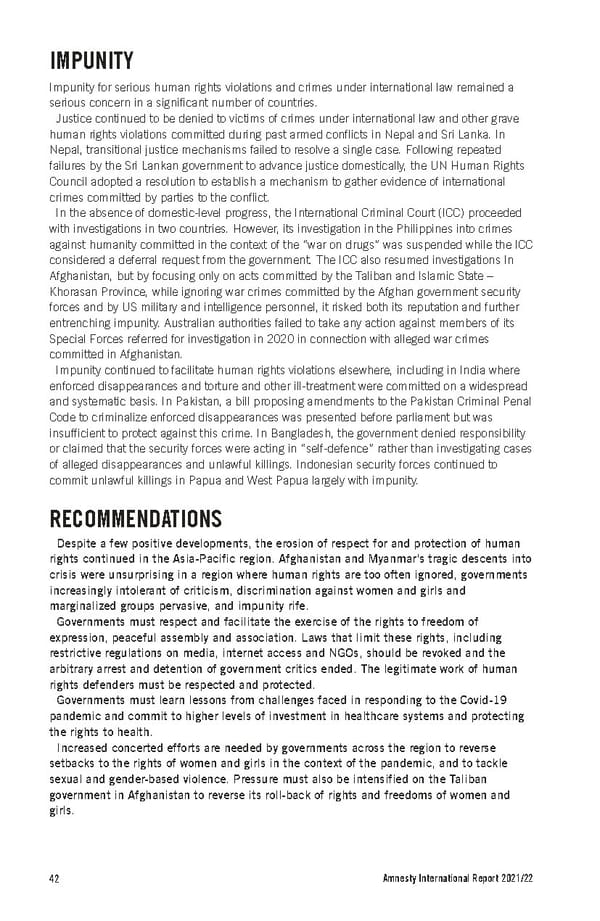IMPUNITY Impunity for serious human rights violations and crimes under international law remained a serious concern in a significant number of countries. Justice continued to be denied to victims of crimes under international law and other grave human rights violations committed during past armed conflicts in Nepal and Sri Lanka. In Nepal, transitional justice mechanisms failed to resolve a single case. Following repeated failures by the Sri Lankan government to advance justice domestically, the UN Human Rights Council adopted a resolution to establish a mechanism to gather evidence of international crimes committed by parties to the conflict. In the absence of domestic-level progress, the International Criminal Court (ICC) proceeded with investigations in two countries. However, its investigation in the Philippines into crimes against humanity committed in the context of the “war on drugs” was suspended while the ICC considered a deferral request from the government. The ICC also resumed investigations In Afghanistan, but by focusing only on acts committed by the Taliban and Islamic State – Khorasan Province, while ignoring war crimes committed by the Afghan government security forces and by US military and intelligence personnel, it risked both its reputation and further entrenching impunity. Australian authorities failed to take any action against members of its Special Forces referred for investigation in 2020 in connection with alleged war crimes committed in Afghanistan. Impunity continued to facilitate human rights violations elsewhere, including in India where enforced disappearances and torture and other ill-treatment were committed on a widespread and systematic basis. In Pakistan, a bill proposing amendments to the Pakistan Criminal Penal Code to criminalize enforced disappearances was presented before parliament but was insufficient to protect against this crime. In Bangladesh, the government denied responsibility or claimed that the security forces were acting in “self-defence” rather than investigating cases of alleged disappearances and unlawful killings. Indonesian security forces continued to commit unlawful killings in Papua and West Papua largely with impunity. RECOMMENDATIONS Despite a few positive developments, the erosion of respect for and protection of human rights continued in the Asia-Pacific region. Afghanistan and Myanmar’s tragic descents into crisis were unsurprising in a region where human rights are too often ignored, governments increasingly intolerant of criticism, discrimination against women and girls and marginalized groups pervasive, and impunity rife. Governments must respect and facilitate the exercise of the rights to freedom of expression, peaceful assembly and association. Laws that limit these rights, including restrictive regulations on media, internet access and NGOs, should be revoked and the arbitrary arrest and detention of government critics ended. The legitimate work of human rights defenders must be respected and protected. Governments must learn lessons from challenges faced in responding to the Covid-19 pandemic and commit to higher levels of investment in healthcare systems and protecting the rights to health. Increased concerted efforts are needed by governments across the region to reverse setbacks to the rights of women and girls in the context of the pandemic, and to tackle sexual and gender-based violence. Pressure must also be intensified on the Taliban government in Afghanistan to reverse its roll-back of rights and freedoms of women and girls. Amnesty International Report 2021/22 42
 Amnesty International Report 2021/22 Page 41 Page 43
Amnesty International Report 2021/22 Page 41 Page 43